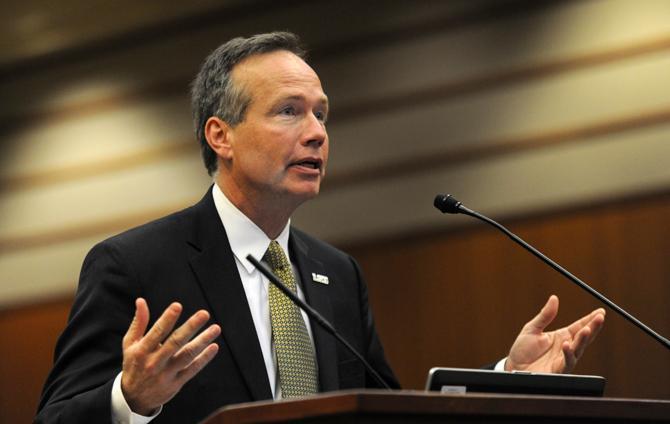The University will be forced to pay additional thousands of dollars in penalties and attorney fees in the lawsuit brought by NOLA.com | The Times-Picayune and The Advocate, a state judge ruled Thursday.
The University Board of Supervisors has faced a long, expensive legal battle with the two news organizations for the last six months over its refusal to release records from its search to fill the newly-created system president position that resulted in the hiring of F. King Alexander.
Alexander’s was the only name released to the public as an applicant, and NOLA.com | The Times-Picayune and The Advocate sued for the release of documents relating to around 35 other “active candidates” for the position.
District Judge Janice Clark awarded the maximum penalty against the University for its failure to respond in a timely manner to her initial order. The University will be fined $200 per day — dating from March 21, when The Advocate first requested the records.
When these fines are totaled, the University will pay approximately $12,000 in penalties to each of the plaintiffs in the case.
Loretta Mince, attorney for NOLA.com | The Times-Picayune and The Advocate, said that the University would also be liable for around $70,000 in attorney fees and $7,000 in other costs. The total cost to the University is estimated at around $105,000, not counting outstanding fees already owed to the court.
The penalty was awarded based on a clause in Louisiana public records law that states defendants may be fined a maximum of $100 per day if the defendant “unreasonably or arbitrarily fails to respond” to a judge’s order.
Clark ruled that the University’s delay in handing over documents relating to the presidential search fits this criterion and that the University must pay the maximum fine to both NOLA.com | The Times-Picayune and The Advocate.
“The defendants’ failure to respond was unreasonable, capricious and without proper cause,” Clark said. “The conduct was unlawful and contemptuous.”
University attorney Jimmy Faircloth contested Clark’s decision on the penalties, saying the University had attempted to respond promptly to all requests of the court.
Mince and her associate, Alysson Mills, argued that the penalties should be awarded because the University’s actions violated a settlement agreement made between the University and The Advocate in a 2001 lawsuit over the search for a new athletic director.
Clark said similar clauses in public records law state the losing side of a suit must provide attorney’s fees for the winning side, and on that basis, the University must pay Mince’s fees and those of her colleagues.
The law states that fees are to be paid based on a rate set by the attorney general, which in this case would provide for $175 per hour for Mince’s service. Based on that rate, Mince said her bill for attorney’s fees would have totaled about $36,000.
However, Clark said because attorney’s fees are within the purview of the judicial branch of government, she could decide to augment the hourly rate. Based on Mince’s expertise in public records and media law, the time involved in the case and loss of other potential clients, Clark set the rate at $350 per hour, which is Mince’s going rate.
Mince said this would come close to doubling the total attorney’s fee bill.
The fines placed upon the University on Thursday are separate from money the University accumulated due to extended contempt of court — bringing the University’s owed total to more than $140,000. Clark held the University in contempt in August, and placed a $500 per day retroactive fine on the University dating from April 30, when Clark originally ordered the documents to be turned over.
The contempt of court fine was put on hold Sept. 16, when Faircloth brought the documents to Clark’s office.
Thursday, Mince said the documents delivered to the court were unsatisfactory and did not cover all “active candidates” in the search, as Clark ordered.
Mince said the number of candidates discussed in the documents provided by Faircloth was “not approximately or about” the 35 that had been previously discussed. However, Mince was not allowed to disclose the exact number or nature of the documents due to a binding agreement between the attorneys.
Faircloth said the University provided all the documents that had been reviewed by the Board of Supervisors in the course of the search and that any documents mentioning other names were private to R. William Funk and Associates, the Texas consultant group that assisted the University with the search process.
University will pay extra penalties
September 26, 2013
LSU President and Chancellor F. King Alexander speaks before the Board of Regents on Aug. 21, 2013 in the Louisiana Purchase Room located in the Claiborne Building in Downtown Baton Rouge.







